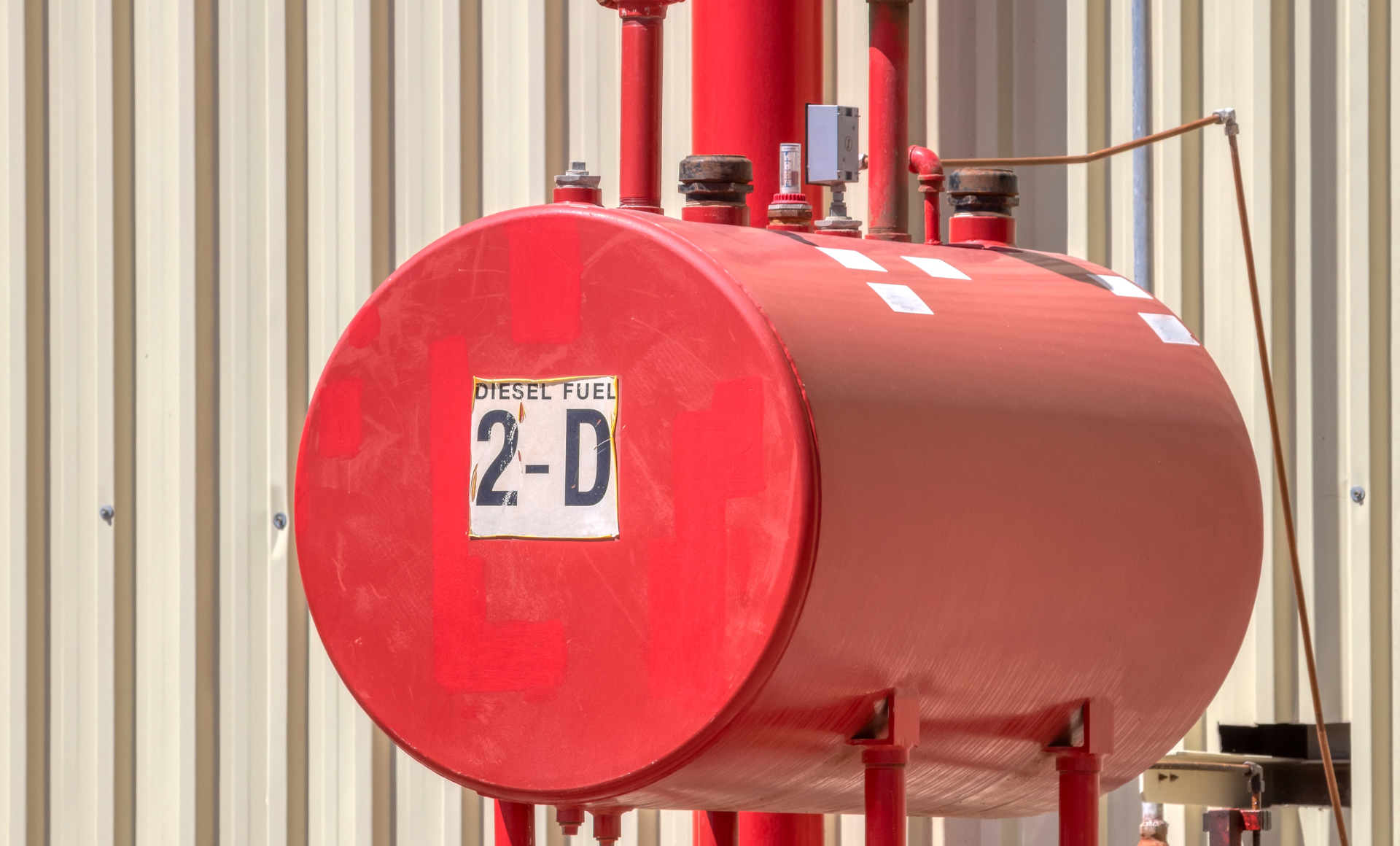Diesel Storage
Solving & Preventing Problems With Diesel Fuel & Diesel Storage Tanks

Fuel storage is an element of the energy plans and emergency preparations of many businesses and most fleets and municipalities. Stored fuels have to be available for use at a moment's notice (whether after a hurricane emergency or just simply for when a long-haul truck pulls up to fill up). These users rely on their stored fuels maintaining the same consistent quality over their storage life as when they were first put in as fresh fuel. They need their fuel to be there when they need it most.
Preserving Stored Fuel Quality
Preserving stored fuel quality means preventing oxidative fuel breakdown (breakdown through oxidation) from exposure to air and light, preventing hydrolytic breakdown through exposure to water, preventing catalytic breakdown from exposure to certain metals, and keeping the storage tank free from microbes.
Oxidative stability breakdown can be prevented through preventive treatment with fuel stabilizers that interrupt the chain of oxidation reactions that happen in the fuel upon exposure to air and elements containing oxygen.
Hydrolytic breakdown can be prevented by controlling the buildup of water within the tank - something that is sometimes inevitable depending on how long the fuel is stored.
Those needing to preserve stored fuel quality turn to fuel stabilizers like Dee-Zol Life for diesel fuel and Bio Dee-Zol Life for stored biodiesel blends. They protect stored fuels and extend the useable storage life of these essential investments, helping the fuel user get the most out of their fuel.
How Water Affects Stored Diesel Quality
The build-up of water is a big problem for stored fuels not only because of the hydrolytic breakdown we mentioned before, but also because water buildup is the most essential element microbes need to establish contamination in a storage tank/system. The microbes then destroy the fuel's quality and render it almost useless for the future purpose that the fuel storer has for it.
Reasons Why Microbe Problems Are Worse
Fuel professionals used to think the reason today's ultra-low sulfur diesel fuels are much more susceptible to these microbial infestations because of the lack of sulfur in the fuel. This was a misunderstanding, however. ULSD fuels are more hospitable to microbes less because of lower sulfur levels and more due to having fewer aromatic molecules (microbes don't like to be around those).
Today's ULSD fuels also attract water more easily than before. Partly because of the change in their composition from their refinery processing, but also, very importantly, because of the low levels of biodiesel mixed into virtually all diesel fuel you're likely to find.
More water means more microbial contamination and more microbial problems.
Biocides Are Essential For Stored Diesel Health
When such a microbial problem appears in stored diesel fuel, the infestation is nearly impossible to get rid of without using a biocide to kill the microbes.
The importance of biocides as a key weapon for protecting stored diesel health is something fuel consumers may not be aware of. Some of this is a holdover of the old wisdom that controlling water would prevent all microbial growth.
No doubt, controlling water is very important (as we said earlier). Quality fuel treatments like Ethanol Defense, DFS Plus, and Dee-Zol can help to control and disperse water as it condenses in a diesel or ethanol blend fuel tank. And this is an important step toward minimizing the conditions most commonly associated with microbes to grow and multiply and thrive.
Inevitably, though, water is going to make its way into a stored fuel system. When this happens, a biocide like Bellicide or ClearKill is needed to keep the microbial colonies. Bellicide not only knocks out existing infestations with complete microbial kills in as little as two hours but is also an extremely cost-effective maintenance product to keep microbes away from growing in fuel tanks, with low treat rates of around 1 ounce to 40 gallons of fuel.
Stored diesel fuels represent a significant financial investment for many companies, municipalities, and fleets. No fleet or fuels manager wants to have to go through the headache of figuring out what they're going to do with several thousand gallons of wrecked fuel. So it makes prudent sense, from a financial and operational standpoint, to undertake good housekeeping and preventive measures to keep the fuel quality from degrading.
Helpful Resources
What's My Fuel Health Score?
Webinar

Fuel Changes and How They Affect You
Webinar

The Fuel Additive Buying Guide
Report

Diesel Engine Manufacturer Position Statements on Aftermarket Fuel Additives
Report

How Do You Know Your Diesel Fuel Is At It's Best?
Report

Fuel Tests You Need To Know About
Webinar

Storing and Dispensing Diesel Fuel
Webinar

Fuel Storage on our Commercial Blog
6 min read
Joint Commission and SPCC Compliance: Where Fuel Tank Requirements Overlap for Hospitals and Data Centers
Erik Bjornstad: Feb 18, 2026
7 min read
Fuel Tests That Actually Predict Failure: Understanding ASTM D6469 and Microbial Testing
Erik Bjornstad: Feb 12, 2026




